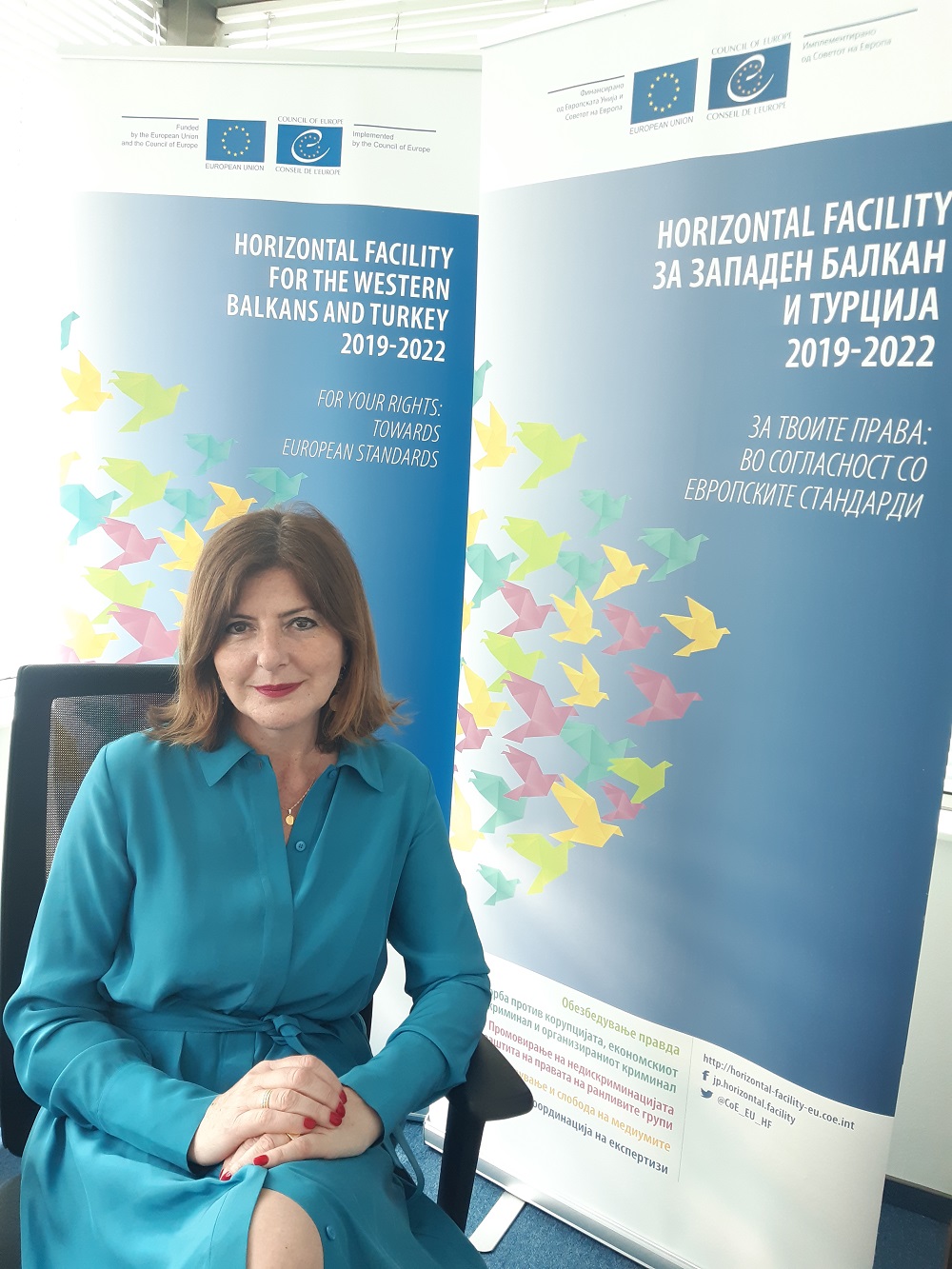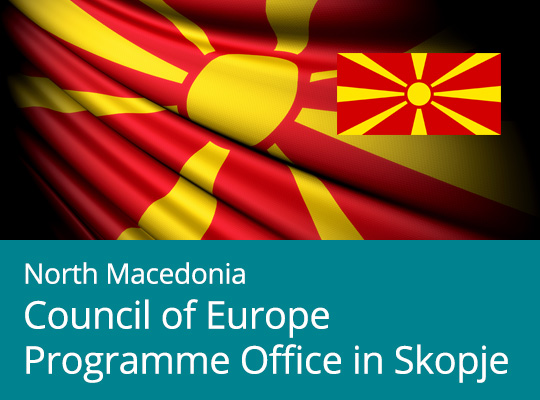Interview with Ms Lejla Dervisagic, Head of Operations, Council of Europe Programme Office in Skopje
- Dear Ms Dervisagic. Thank you for this interview.
In your position as the Head of Operations, Programme Office of the Council of Europe in Skopje can you briefly share with us the Council of Europe main activity in North Macedonia and the efforts in helping the country to apply the European values and Council of Europe standards in protecting fundamental human rights?
The Council of Europe is continent’s leading human rights organisation. It comprises 47 member states. 47 governments signed up to the European Convention on Human Rights - a treaty designed to protect human rights, democracy and the rule of law - have made a legal commitment to abide by certain standards of behavior and to protect the basic rights and freedoms of all of us.
North Macedonia became the 38th member State of the Council of Europe on 9 November 1995 and is actively involved in all aspects of the mission and work of the Council of Europe. The Council of Europe Programme Office in Skopje was established in 2012, covering a variety of co-operation projects.
One of the unique advantages of the Council of Europe is the strategic triangle of standard-setting, monitoring of member states’ commitments in implementing the standards and, corresponding co-operation programmes. Assistance and co-operation activities are the essential tools for promoting the practical implementation of the Council of Europe’s standards and mechanisms in its members states.
Working in close collaboration with the national authorities, representatives of the civil society and other partners, the Council of Europe Programme Office in Skopje is currently implementing important initiatives under the auspices of the European Union and Council of Europe joint programmes, with a particular focus on the reform in the justice system, fight against economic crime, promoting anti-discrimination and protecting the rights of vulnerable groups as well as improving the application of the European standards in the field of freedom of expression and freedom of the media.
We are also working on Roma inclusion at the local level and on the fight against cybercrime.
- Allow us to focus on the field of freedom of expression and the media. Aware that since 2019, the Council of Europe Programme Office in Skopje is implementing the action on “Freedom of expression and freedom of the media in North Macedonia”, as part of the joint European Union and Council of Europe programme “Horizontal Facility for Western Balkan and Turkey 2019-2022”, can you share with us more details about this initiative itself? Why it is important and what does it mean for the citizens of North Macedonia?
The Horizontal Facility for the Western Balkans and Turkey 2019-2022 is a co-operation initiative of the European Union and Council of Europe for the Western Balkans region and Turkey aiming to assit Beneficiaries to comply with Council of Europe standards and European Union acquis in the framework of the enlargement process. The action on Freedom of Expression and Media, is part of this programme and builds upon the results from its first phase, which was implemented from 2017-2019. The second phase of the action, until 2022 will continue working with the key stakeholders and key actors towards ensuring European standards in the field of freedom of expression and media.
The action is composed of three main components: (1) building the capacities of legal professionals (judges, prosecutors and lawyers), having a valuable cooperation with the Academy for Judges and Public Prosecutors and the Bar Association of North Macedonia; (2) support to media regulatory body, concretely to the Agency for Audio and Audiovisual Media Services of North Macedonia, on the harmonisation of the regulations with the European standards; (3) the work with civil society organisation and universities where we can stress the close co-operation with the “Association of Journalists of Macedonia”. In this framework we have also signed a Memorandum of Understanding with the Faculty of Law “Iustinianus Primus” for the implementation of several activities in the field of advancing freedom of expression that target university professors and students.
Consequently, we are working on all the levels and involving various actors and stakeholders to ensure a structured approach towards a better protection of freedom of expression and freedom of the media in North Macedonia, as stipulated in the Article 10 of the European Convention on Human Rights and its case-law.
- Freedom of expression takes a particular importance in times of crisis. The COVID-19 pandemic we experienced had a direct impact in our fundamental rights and in particular on the freedom of expression, stressing potential challenges and restrictions to enjoy such right.
How you have aimed to address this through the action on “Freedom of expression and freedom of the media”?
This health crisis has put all human rights to test, including the right to freedom of expression. The Council of Europe as a human rights organisation involves many legal instruments, recommendations and guidelines applicable to sanitary crisis which we are broadly promoting through our action. In this context important documents have been issued by Council of Europe bodies to the member states on their role to ensure a better protection of human rights during the crisis. They were translated and made available also for the local actors and audiences in North Macedonia, such as the Guidelines from the Committee of Ministers of the Council of Europe on Freedom of expression in time of crises , the SG/Inf(2020)19 The impact of the sanitary crisis on freedom of expression and media freedom, and the SG/Inf(2020)11, Respecting democracy, rule of law and human rights in the framework of the COVID-19 sanitary crisis Toolkit for member states issued by the Secretary General on 7 April 2020.
It is important to mention that despite the restrictions and challenges caused by the pandemic, our work continued by conducting key online activities and hybrid events, ensuring continuity of our assistance to local actors and key beneficiaries in the efforts to advance freedom of expression and the media in North Macedonia.
- What are some key interventions and achievements of your action but also challenges you have faced?
As we mentioned, an important component of our action is the capacity building for key actors in the field of freedom of expression. Thus, we have successfully conducted various ‘Training of Trainers’ programmes on key topics related to the freedom of expression and the freedom of the media. As a result, now we have extended the pool of local trainers who are skilled to conduct cascade trainings with professionals in the field. In this framework, we are assisting them in further building capacities of the national legal professionals to ensure a better understanding and protection of the freedom of expression concerning key topics, including media and elections, availability of the media for people with sensory disabilities, monitoring and reporting on gender-based violence in the media etc.
Our close co-operation with the Association of Journalists of Macedonia, has resulted in a series of webinars addressing important topics of concern for North Macedonia, such as defamation and insult, safety of journalists and the cooperation between journalists and parliamentarians. Apart the participation of the journalists, these webinars were attended also by key decision-makers, high officials including the Minister of Justice, the President of the Assembly of Republic of North Macedonia, state advisors from the Government, etc. As a result, several relevant amendments to the legal framework related to safety of journalists were prepared and waiting to be adopted.
Currently we are working closely with the public authorities to support their efforts on the alignment of the national legislation with the new EU's Audiovisual Media Services Directive.
- Let’s speak a bit more in details about the activity of judges, public prosecutors and lawyers in the context of the freedom of expression. They have an important role in ensuring freedom of media, media regulation and self-regulation, protection of journalist, protection of whistleblowers, hate speech etc. .
How is the action contributing?
Freedom of expression and freedom of the media is a very dynamic field, the means of communication are developing and changing very quickly, there is always something new to explore and learn. The jurisprudence of the European Court of Human Rights related to the Article 10 (freedom of expression) of the European Convention on Human Rights - the basis of our work - is evolving too. Thus, considering all the reasons, there is a constant need for additional trainings of legal professionals.
In our activity with legal professionals who have welcomed our workshops, we are focusing on specific topics of interest such as defamation and insult, hate speech, protection of journalist and protection of whistleblowers, restrictions to freedom of expression, freedom of expression and the internet and so on.
- How would you assess the cooperation with public actors and other partners?
Can you share with us some key priorities for the future?
Our work with our key beneficiaries and main partners is tailored to provide ownership and sustainability as well as to ensure continuity for the future based on European best practices.
In this context, our action will continue to provide capacity building to the legal professionals in the field of freedom of expression, while planning to produce key studies and seminars in co-operation with the Association of Journalists of Macedonia, to involve students and journalists.




